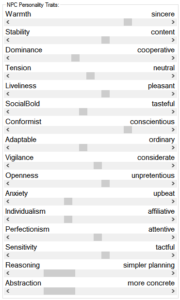They, who are not what they seem…
This week, I’m talking about personalities that are not what they seem, and Jekyll and Hyde is one of the best examples. A mild-mannered man (Dr Jekyll) drinks a potion that turns him into a sociopath known as Mr Hyde (read the plot here), and though they are one and the same person, their personalities are completely different. Another example, from the real world this time, would be serial killers who manage to live double lives. Some were even pillars of the community, caught only when they got sloppy, and shocking everyone around them.
These are examples of those who are able to put on a different “face” in different situations. But these examples need not be so extreme to show their usefulness. Take, for example, the tough drill instructor who is completely compassionate with his family at home. His job requires a certain set of personality traits be used, and though they do not define who he is at home, they define who he is while working. This holds true for many jobs, where personalities have certain traits accentuated while performing duties. Wait staff who smile through a day to get better tips, or sales staff negotiating with a potential customer, to intelligence personnel who assume personalities to help turn someone against their own country, to police who need to seem that they are understanding of those they interrogate in order to facilitate a confession.
Even in short-term situations, such as not being the jerk at the wedding, even though you want to, or feigning interest in something a coworker has to say, even though you’d rather be anywhere else, because you need to be polite.
Social norms enforce all kinds of rules on our personalities, and those rules usually are there to prevent some of our more extreme personality traits from doing damage to others or yourself (don’t yell at your boss, or else you’ll get fired). These rules are bendable- and breakable, and have consequences. But they are there nonetheless, and they make up our societal structures.
Example culture: The Charkritians
For Epic Frontiers, as with many MMOs, we created a number of cultures that would populate the world and give the players factions to be part of. Some of these factions were aligned, and some were opposed, and others still were more or less neutral (which just makes them opposed or aligned to everyone at once).
One of the factions were the Charkritians, a used-to-be nomadic people living on the central continent with a large expanse of desert in the center which has shaped their history and culture. As a result, Charkritians as a whole value grit and endurance, and still practice many of the traditions of their ancestors such as travelling caravans through the Hamak’Del (“Great Desert”) to trade, etc. Festivals, informality, tradition, and some levels of individualism also feature largely in their culture, and as such they tend to like a good party, straight talk, and going it alone.
However, in the lore of Epic Frontiers, this part of the galaxy had endured a massively destructive pandemic, where most of the current generation of young were put into camps for education by an interstellar authority. The breakdowns of social order and perceived interference by outsiders has strained the relations between those who lived through the pandemic (represented by the NPCs of the world), and those leaving the massive orphanages and schools (represented by the players). In this dynamic, the older Charkritians are not necessarily as open as they normally would be, especially with the memories of social breakdowns fresh in their minds, and all of the problems that those entailed. To those they know, they’re as warm and open as ever. But to the newcomer roaming the country-side for adventure, they are more wary, withholding judgement for the most part until the player proved themselves (mostly through the conversation system, as well as quests).
This situation can see an NPC’s personality change from the first one (“normal”) to the second one (when dealing with newcomers):


Top: Normal personality. Above: Modified personality when dealing with unfamiliar people…
Trait Modifiers
The above images illustrate the change pretty well, though the issue remains how one would do this? Very simply: Through the Trait Modifier mechanism. Trait Modifiers can be triggered in a variety of situations and, like equipping or un-equipping items in a game, act as modifiers on the personality traits. The data structure is not important here, but it is essentially a set of numbers that are positive or negative and indicate either which way to nudge the traits, or what the trait level should be. Summing functions allow for Trait Modifiers to stack (or not, as some stacking results in personality traits going into extremes), and other data that is necessary includes the ability to describe the situations in which these modifiers can be triggered.
With the above features in place, you can script the personality changes as well as allow the PAI to detect the situations and trigger them automatically. A character possessing (or lacking) a certain item can trigger changes in personality for NPCs, such as a lone bandit acting reasonably to a pair of well-armed individuals passing on a trail, yet falling upon a lone, unarmed traveler.
Assignment of Trait Modifiers can be done manually, or when the conditions for the Trait Modifier are matched. Purposefully, these conditions are open-ended, and are matched as a set of “value-key” combinations, but in that lies the ability to have a rich set of social rules for personalities, some global, and some pertaining to cultures, belief systems, professions, or even some specific traits or items. For example, a ring of unimaginable power that quickly corrupts those with a medium-to-high level of Dominance would be very easily implemented without needing to script the specific change as part of the equipping action.
Next Blog: I may cover Utility Theory as it pertains to PAI, or maybe some co-op game mechanics from Epic Frontiers, since I seem to be catching up with the current tasks for Interrogative.

